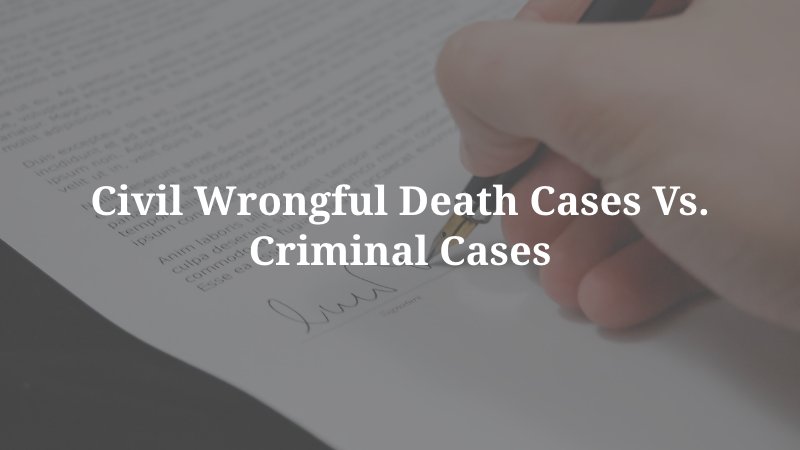What is the Difference Between Civil and Criminal Cases regarding Wrongful Death?
Wrongful death cases are legal proceedings brought by the family of a deceased individual against a person or entity responsible for the loss of their loved one. This legal action is sometimes pursued in addition to a criminal case. However, the procedures and outcomes of each type of case are significantly different.
Civil Wrongful Death Cases vs. Criminal Cases

In a civil wrongful death case, the family of the deceased files a lawsuit against the responsible party to seek monetary damages for their loss. These damages may include compensation for lost wages, medical bills, funeral expenses, pain and suffering, and other costs associated with the death. In addition, the court may also award punitive damages as a way to punish the defendant (at-fault party) for their negligence or other wrongful actions. The burden of proof in a civil case is lower than in a criminal case. A successful outcome is determined by a preponderance of the evidence instead of beyond a reasonable doubt. In other words, you must prove the defendant was more likely than not responsible for your loved one’s death.
In a criminal wrongful death case, the state or federal government files a criminal complaint against the responsible party. The purpose of this action is to punish the defendant for their actions and keep them from engaging in similar behavior in the future. The criminal court seeks to determine guilt or innocence “beyond a reasonable doubt.” If the defendant is found guilty, they may face jail time, fines, or other penalties.
Can You Pursue a Civil Wrongful Death Claim Even If There is No Criminal Conviction?
It is possible to win a civil wrongful death claim even if criminal charges are not filed, or there is no criminal conviction. Civil and criminal cases have different standards of proof, and the decision to file criminal charges is at the prosecutor’s discretion, based on whether they believe they can prove the case beyond a reasonable doubt. Because of the lower standard of proof in civil wrongful death cases, the plaintiff must only prove that the defendant’s actions were the direct or proximate cause of the death and that the death caused financial and emotional harm to the family or beneficiaries of the deceased.
As a result, in some cases, a defendant may be found not guilty in a criminal trial but still, be held liable in a civil wrongful death claim. In contrast, a criminal conviction can be helpful in a wrongful death claim. It provides strong evidence of their responsibility for the death. For example, if the defendant was convicted of drunk driving at the time of the accident that caused the death, this can be used as evidence of their negligence and help support a claim for compensation.
Does a Criminal Conviction Automatically Mean Civil Liability?
A criminal conviction does not automatically mean civil liability in a wrongful death case. While it can be strong evidence of the defendant’s responsibility for the death, civil liability requires a separate legal process and different standards of proof.
If you have lost a loved one in a preventable accident, a trusted Atlanta Wrongful Death Lawyer can support you and your family at this devastating time and help you hold the wrongful party accountable. Arrange a free consultation today.

